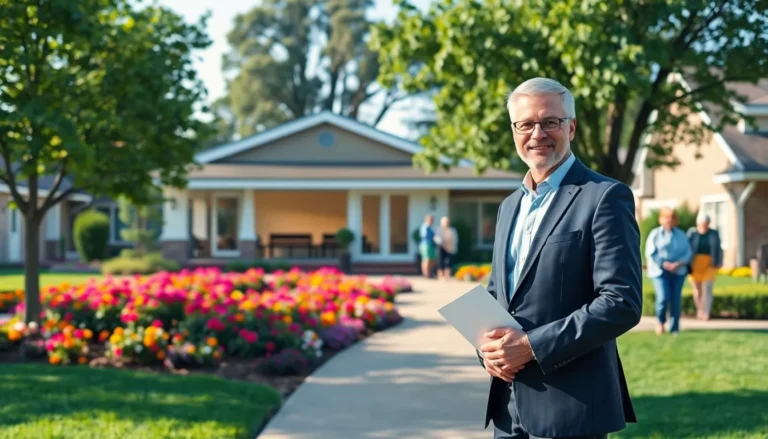Imagine living in a place where you don’t have to pay property taxes, sounds too good to be true, right? Well, it isn’t. While many folks feel like property taxes take a hefty bite out of their wallets, certain states have put their foot down and said ‘no thanks’ to this financial burden. Let’s take a light-hearted but informative jaunt through the wonderful world of tax-free living, exploring what it truly means to be in a state without property taxes. Get ready to take notes, this might just be the start of your new adventure.
Table of Contents
ToggleUnderstanding Property Taxes

Property taxes often leave homeowners with a sinking feeling every April when the bills roll in. So, what exactly are property taxes? At their core, they’re funds collected by local governments, which use this revenue to pay for schools, roads, law enforcement, and other vital community services. Typically, property tax rates can vary dramatically even within the same state, often depending on local budgetary needs.
To understand the landscape, it’s crucial to differentiate between property taxes and other forms of taxation like income tax or sales tax. While it might seem logical to attack property taxes as the culprit for high costs of living, they actually play a critical role in funding community needs. But, some states have found alternative ways to generate revenue, leading us to the delightful discovery of tax-free living.
Why Some States Have No Property Taxes
You might be wondering how some states manage to operate without property taxes. The answer lies in a combination of strategic economic policies and alternative revenue streams. For instance, some states have higher income taxes instead, while others rely more heavily on sales taxes or fees for services.
Take, for example, states like Florida, which lean on tourism and sales taxes. This way, tourists foot a significant portion of the bill that fuels local infrastructure. Meanwhile, states like New Hampshire benefit from a strong economy and business-friendly policies, so relying less on property tax revenue to fund essential services.
Also, a sprinkle of political philosophy often comes into play. Some states adopt a mindset that an individual’s home should not be a source of financial strain. This ideological stance often resonates well with citizens looking for a financially sustainable environment, promoting a lifestyle free from the yearly dread of property tax payments.
List of States With No Property Taxes
Now, let’s jump into the juicy part: which states have thrown property taxes out the window? Here’s a handy list of states where you can live tax-free:
- Alaska: The Last Frontier is also a no-property-tax paradise. Residents enjoy an annual dividend from the Permanent Fund, funded by oil profits.
- Florida: While famous for its theme parks, it’s also known for its lack of property tax. Residents pay higher sales taxes, balanced by an influx of tourists.
- Nevada: Gamblers rejoice. The Silver State’s income is largely driven by tourism and casino revenues, meaning no property tax here.
- South Dakota: Known for its low overall tax burden, South Dakota does not levy property taxes on homeowners.
- Wyoming: With a booming mineral industry, Wyoming maintains no property taxes, so enticing residents and businesses alike.
These states not only promise an escape from property taxes but also cultivate environments that can help residents thrive.
Pros and Cons of Living in No-Tax States
Living in a no-property-tax state is nothing short of titillating. But, every rose has its thorns. On the pro side:
- Financial Freedom: The most obvious perk is the increased disposable income. This means more trips to the beach or that shiny new boat.
- Attractive for Investors: Property values can appreciate without the burden of annual taxes, making it an attractive destination for homebuyers and investors alike.
- Business Friendly: Many no-tax states are also pro-business, encouraging entrepreneurship and innovation.
Now, don’t forget, every slice of paradise has its caveats:
- Potential for Higher Other Taxes: Be prepared for alternative taxes like sales or income taxes that can make living expenses skyrocket.
- Limited Local Services: Less revenue from property taxes often translates to fewer local services, which can affect schools and infrastructure.
- Resilience in Downturns: When economies falter, some no-tax states may struggle more than others reliant on property tax revenue for stability.
Eventually, it’s essential to weigh these factors carefully, what’s freedom to one might be a burden to another.
Impact on Local Services and Infrastructure
Have you ever pondered what happens to essential services like schools and public safety in no-property-tax states? It’s a valid concern. Typically, without a robust property tax base, states rely more on sales tax, income tax, or even federal funding to keep the lights on.
This reliance can lead to uneven funding for public services across various communities. In tax-free states, urban areas might flourish while rural regions face funding challenges. Schools often take the brunt of these discrepancies, with some districts receiving significantly more support than others based on local economic conditions.
Also, infrastructure development can take a hit. Roads, emergency services, and public facilities may suffer if the revenue generated from alternative tax streams isn’t sufficient to meet growing demands. Citizens in these states often find themselves engaging in more discussions about budget priorities and public service funding, creating an active civic environment.
How to Navigate Moving to a No-Tax State
Thinking about taking the plunge and moving to a no-property-tax state? Here’s how to keep yourself organized during the transition:
- Research & Evaluate: Start by evaluating your needs. Consider what local amenities, climate, and living costs are important to you. Each state offers uniquely attractive characteristics.
- Find a Knowledgeable Realtor: A local expert can provide invaluable assistance in navigating the real estate market. They’ll help you find homes while considering cost-effective choices.
- Adjust Your Budget: Without property taxes, you may have to allocate those funds elsewhere. Remember, sales taxes or alternative taxes might impact your budget down the line.
- Engage with the Community: Once you’ve made the move, jump into local activities and get involved. Building connections can help you feel at home and understand the dynamics of the local economy.
Relocating can be a gas, but it requires planning and smart decision-making.







